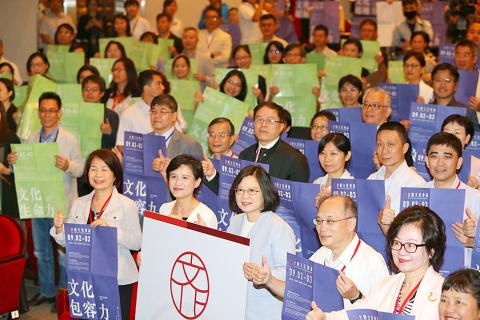President Tsai Ing-wen (蔡英文) yesterday said she is looking forward to more democratic and diverse dialogue at the National Cultural Congress, promising that the advice received from the public at the congress would be incorporated into her administration’s cultural policy white paper.
Speaking at the opening ceremony, Tsai called on academics and the public to engage in discussions and present ideas that can elevate cultural policies.
“We live in changing times and cultural policy needs new ideas and experimentation,” she said. “We have to upgrade our cultural policy as the nation transitions.”

Photo: CNA
A wave of digitalization and the increased footprint of foreign immigrants and workers have enriched Taiwan’s culture since similar congresses in 1990, 1997 and 2002, she said.
“We are all cultural citizens, each with the right to find the core values of Taiwan’s culture,” Tsai said.
“Taiwan is not large, but our cultural soft power does not lag behind that of the world’s major countries,” she said, adding that culture is the nation’s soul and bestows power when it has vitality.
Tsai, who attended the previous National Cultural Congress as then-head of the Mainland Affairs Council, said that the nation’s soft cultural power — including the opening ceremony of the Taipei Summer Universiade last month and HBO Asia’s TV series The Teenage Psychic (通靈少女) — “do not pale in comparison to that of other countries.”
“These examples show that we are becoming more international and if we can establish a more complete system, the younger generation will be able to find its roots here and in the process dig up an endless amount of subject material,” she said.
This congress is an important milestone and the advice of different sectors of society would be incorporated into a national white paper on cultural policy after a clear consensus is reached, Tsai said.
“We are inviting everyone to cultivate Taiwan’s culture together and this task is not going to end just because we have held a meeting today,” she said.
The congress is the culmination of cultural meetings across the nation from March to June that have helped the public to express their thoughts on the administration’s cultural policies.
Minister of Culture Cheng Li-chiun (鄭麗君) said her discussions with groups and workers left her with a strong sense that many feel “the government’s support system is never adequate.”
The government’s cultural policy needs to integrate with everyday life, Cheng said.
Preparations for the congress had been under way for more than a year and it followed a “marathon” half-year of regional meetings, she said.

INVESTIGATION: The case is the latest instance of a DPP figure being implicated in an espionage network accused of allegedly leaking information to Chinese intelligence Democratic Progressive Party (DPP) member Ho Jen-chieh (何仁傑) was detained and held incommunicado yesterday on suspicion of spying for China during his tenure as assistant to then-minister of foreign affairs Joseph Wu (吳釗燮). The Taipei District Prosecutors’ Office said Ho was implicated during its investigation into alleged spying activities by former Presidential Office consultant Wu Shang-yu (吳尚雨). Prosecutors said there is reason to believe Ho breached the National Security Act (國家安全法) by leaking classified Ministry of Foreign Affairs information to Chinese intelligence. Following interrogation, prosecutors petitioned the Taipei District Court to detain Ho, citing concerns over potential collusion or tampering of evidence. The

NEGOTIATIONS: Taiwan has good relations with Washington and the outlook for the negotiations looks promising, Minister of Economic Affairs J.W. Kuo said Taiwan’s GDP growth this year is expected to decrease by 0.43 to 1.61 percentage points due to the effects of US tariffs, National Development Council (NDC) Minister Paul Liu (劉鏡清) said at a meeting of the legislature’s Economics Committee in Taipei yesterday, citing a preliminary estimate by a private research institution. Taiwan’s economy would be significantly affected by the 32 percent “reciprocal” tariffs slapped by the US, which took effect yesterday, Liu said, adding that GDP growth could fall below 3 percent and potentially even dip below 2 percent to 1.53 percent this year. The council has commissioned another institution

NEGOTIATIONS: The US response to the countermeasures and plans Taiwan presented has been positive, including boosting procurement and investment, the president said Taiwan is included in the first group for trade negotiations with the US, President William Lai (賴清德) said yesterday, as he seeks to shield Taiwanese exporters from a 32 percent tariff. In Washington, US Trade Representative Jamieson Greer said in an interview on Fox News on Thursday that he would speak to his Taiwanese and Israeli counterparts yesterday about tariffs after holding a long discussion with the Vietnamese earlier. US President Donald Trump on Wednesday postponed punishing levies on multiple trade partners, including Taiwan, for three months after trillions of US dollars were wiped off global markets. He has maintained a 10 percent

TRADE: The premier pledged safeguards on ‘Made in Taiwan’ labeling, anti-dumping measures and stricter export controls to strengthen its position in trade talks Products labeled “made in Taiwan” must be genuinely made in Taiwan, Premier Cho Jung-tai (卓榮泰) said yesterday, vowing to enforce strict safeguards against “origin laundering” and initiate anti-dumping investigations to prevent China dumping its products in Taiwan. Cho made the remarks in a discussion session with representatives from industries in Kaohsiung. In response to the US government’s recent announcement of “reciprocal” tariffs on its trading partners, President William Lai (賴清德) and Cho last week began a series of consultations with industry leaders nationwide to gather feedback and address concerns. Taiwanese and US officials held a videoconference on Friday evening to discuss the